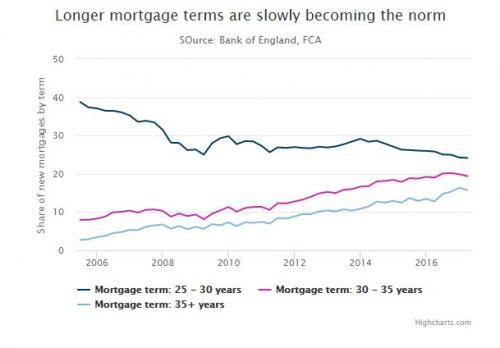Consumers in the UK have been on a credit binge since the Bank of England cut its benchmark interest rate to an all-time low as investors braced for the widely anticipated economic shock of Brexit – a shock that, unsurprisingly, has yet to arrive, despite warnings from the academic establishment that a “leave” vote would trigger an imminent economic catastrophe. And now, with total credit growth rising at 10% a year, the BOE is warning that the increase in unsecured lending is becoming increasingly unsustainable.

While the central bank is less concerned with mortgage debt than credit-card debt and other types of consumer credit, some at the bank are beginning to worry that the growing demand for long-term mortgages will shackle borrowers with a lifetime of debt, according to the Telegraph.
“British families are signing up for a lifetime of debt with almost one in seven borrowers now taking out mortgages of 35 years or more, official figures show.
Rapid house price growth has encouraged borrowers to sign longer mortgage deals as a way of reducing monthly payments and easing affordability pressures.
Bank of England data shows 15.75pc of all new mortgages taken out in the first quarter of 2017 were for terms of 35 years or more. While this is slightly down from the record high of 16.36pc at the end of 2016, it has climbed from just 2.7pc when records began in 2005.”
The steady rise has triggered alarm bells at the BOE, prompting regulators to warn that the trend risks storing up “problem[s] for the future” if lenders ignore the growing share of households prepared to borrow into retirement. Indeed, bank figures show one in five mortgages today are between 30 and 35 years, up from below 8% in 2005, as the traditional 25-year mortgage becomes less popular.

There’s also the unaffordability question. That borrowers are opting for longer mortgage terms means they’re finding rent and mortgages are growing increasingly unaffordable, a worrying sign as credit expands.













Leave A Comment